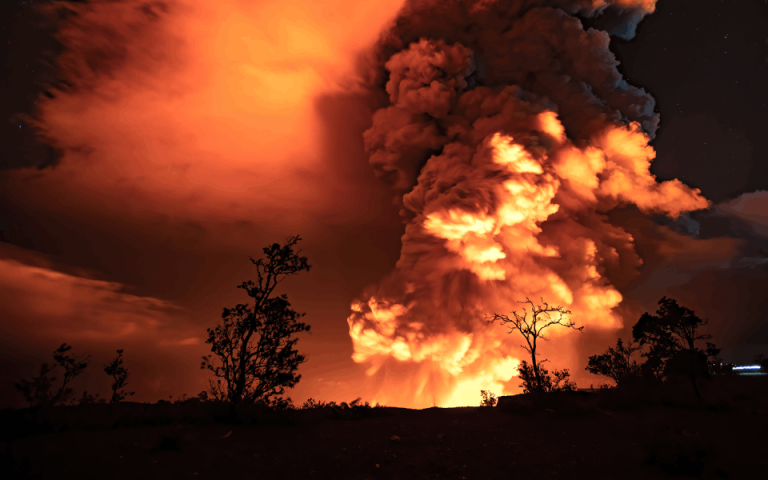Disaster early-warning systems can succeed – but collective action is needed
15 November 2023
A UCL-led comment paper published in Nature this week highlights the many global gaps in natural hazard early warning systems and urges the science and broader community to get involved.

Early warnings have long been known to be vital for saving lives and economic pain when disaster threatens, and the nations of the world have committed to significantly increase the availability of and access to multi-hazard early warning systems, through the UN Sendai Framework for Disaster Risk Reduction 2015-2030.
Progress on this goal has been lagging, leading to the UN announcing a five-year Early Warnings for All initiative last year, seeking to ensure that “everyone on Earth is protected from hazardous weather, water, or climate events through life-saving early warning systems by the end of 2027.”
Authors of the comment paper, Australian meteorologist Dr Andrew Tupper (a UCL Warning Research Centre affiliate) and Professor Carina Fearnley (Director of the UCL Warning Research Centre), argue that, although these efforts are necessary and welcome, they will fail without significantly more commitment from countries, communities, and others including the science community.
Focusing on setting the agenda in research, the comment highlights that risks are accelerating, becoming ever more complex and multiple, and yet warning systems have been lagging behind. Therefore, individuals and organisations are urged to commit to a combined top-down and bottom-up approach to work across the many silos involved, create inclusive warnings, collaborate across borders, and invest in warnings.
Lead author Dr Andrew Tupper said: “Progress in developing early warning systems has been positive but is patchy. At every level – internationally, regionally, and locally – there are major gaps and discontinuities in warning systems. As a simple example, only about 35% of Earth’s historically active volcanoes are continuously monitored, and there is no global mechanism to fill that gap even though the larger eruptions pose catastrophic risks and affect multiple countries, as we saw from Tonga last year. Are we going to act surprised when the next big eruption happens, or are we going to collectively work out how to do something about that?”
Co-author Professor Carina Fearnley noted: “We can’t sit back and assume that everything will be fixed from the top-down. Effective early warnings require community engagement and empowerment to be effective, requiring a more integrated and people-centered approach. Given that the most vulnerable communities typically suffer the most in a disaster, this is a tough and challenging ask, but our practical assistance to these communities is the benchmark by which we should be measuring warning system effectiveness.
“Whatever our role – whether it’s scientists, government officials, or community organisers - we have to see it in the total warning system, and empower each other to work together to do things better.”
The paper is published ahead of the COP28 UN Climate Change conference starting on 30 November. The Early Warnings for All initiative is on the conference agenda, as well as the launch of Risk-informed and Early Action Secretariat’s initiative called Getting Ahead of Disasters: A Charter on Finance for Managing Risks, which sets out “principles aimed at enhancing the use of finance to mitigate risks and protect the most vulnerable from climate-related disasters.”
UCL Warning Research Centre
The UCL Warning Research Centre (WRC) is a joint venture between the Department of Science and Technology Studies and the Institute of Risk and Disaster Reduction at UCL focusing on all aspects in relation to warnings for all forms of risks and disasters.
Founded in 2020, the WRC brings together expertise already established at UCL with warning expertise at universities globally to work with businesses, government, non-governmental, and intergovernmental organisations to address the growing need for effective warning and alert systems via cutting-edge research, policy guidance, applications, and collaborative expertise.
WRC is transforming research into warnings and alert solutions by being strongly interdisciplinary and innovative.
Links
- Original comment paper in Nature
- Early Warnings for All initiative
- Getting Ahead of Disasters: A Charter on Finance for Managing Risks
- Professor Carina Fearnley’s academic profile
- Dr Andrew Tupper’s profile
- UCL Warning Research Centre
- UCL Science and Technology Studies
- UCL Institute for Risk and Disaster Reduction
Image
- Spectacular plumes of gas and ash reflect the glow from lava in the summit crater of Kīlauea volcano. Credit: NPS Photo/J.Wei.
Media contact
Ingrida Bertasiute
i.bertasiute [at] ucl.ac.uk
 Close
Close

